Case Study: Leadership and Management in Priory Hospital Nursing
VerifiedAdded on 2023/04/21
|26
|3807
|349
Case Study
AI Summary
This case study examines the leadership and management practices within Priory Hospital, focusing on the actions of a lead nurse, Majid Mouratsing, and their impact on patient care. The analysis delves into the timeline of events, highlighting breaches in patient safety and the nurse's fitness to practice, as per NMC guidelines. The assignment covers relevant national and local health policies, ethical considerations, and the roles and responsibilities of a qualified nurse. It explores leadership styles, team working, and clinical governance, offering recommendations for improving leadership and management. The study emphasizes the importance of ethical practice, adherence to the NMC code, and the application of leadership theories to enhance patient outcomes and overall healthcare quality. The case study identifies potential barriers to change and suggests strategies for improvement, including the implementation of autocratic and Laissez Faire leadership styles to improve critical thinking among nursing professionals. The document analyzes how these factors contributed to the events and identifies areas for improvement in leadership and management to prevent similar incidents in the future, ensuring adherence to the 6 C's of nursing: compassion, competence, communication, courage, commitment, and care.
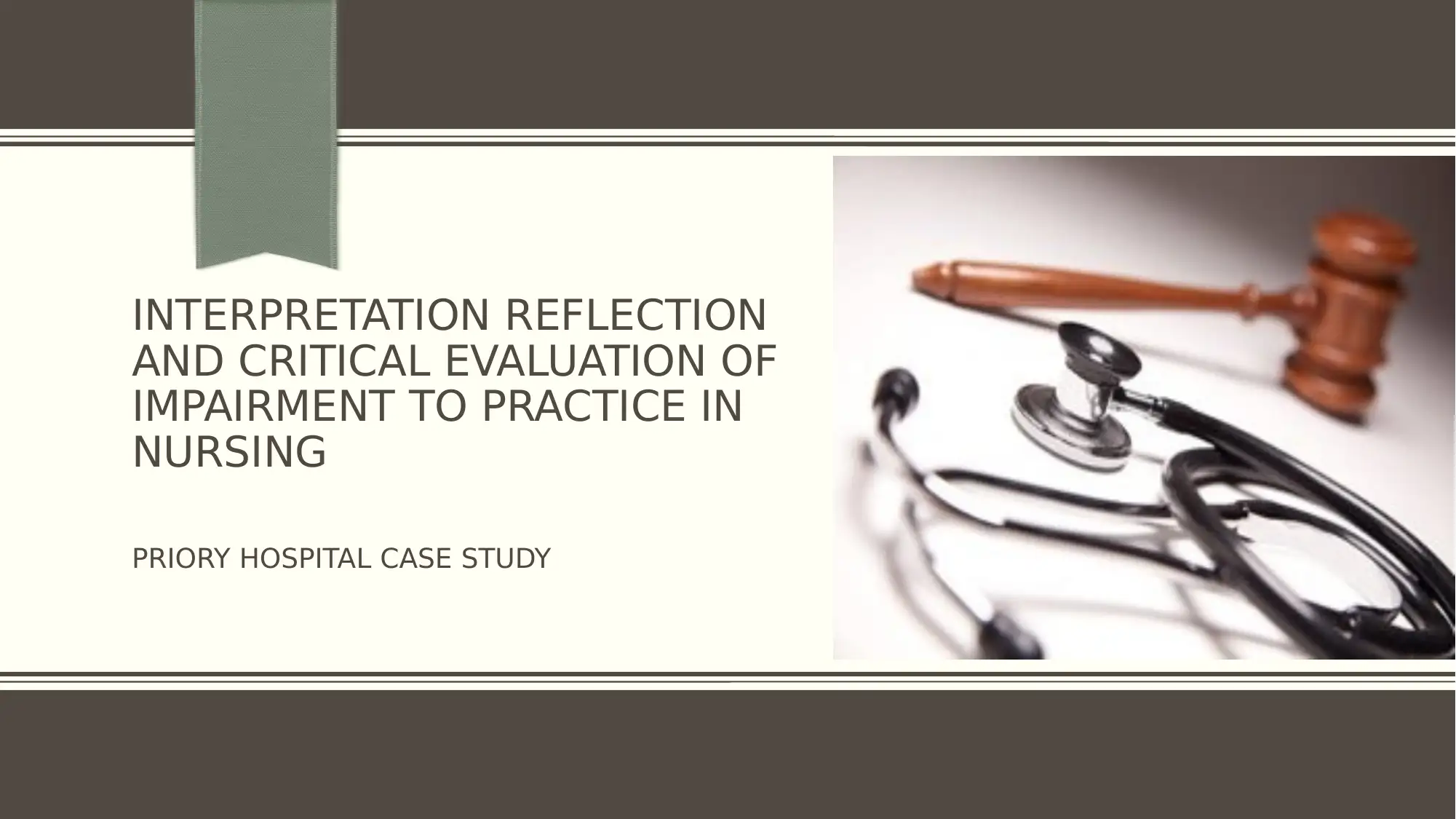
INTERPRETATION REFLECTION
AND CRITICAL EVALUATION OF
IMPAIRMENT TO PRACTICE IN
NURSING
PRIORY HOSPITAL CASE STUDY
Click icon to add picture
AND CRITICAL EVALUATION OF
IMPAIRMENT TO PRACTICE IN
NURSING
PRIORY HOSPITAL CASE STUDY
Click icon to add picture
Paraphrase This Document
Need a fresh take? Get an instant paraphrase of this document with our AI Paraphraser
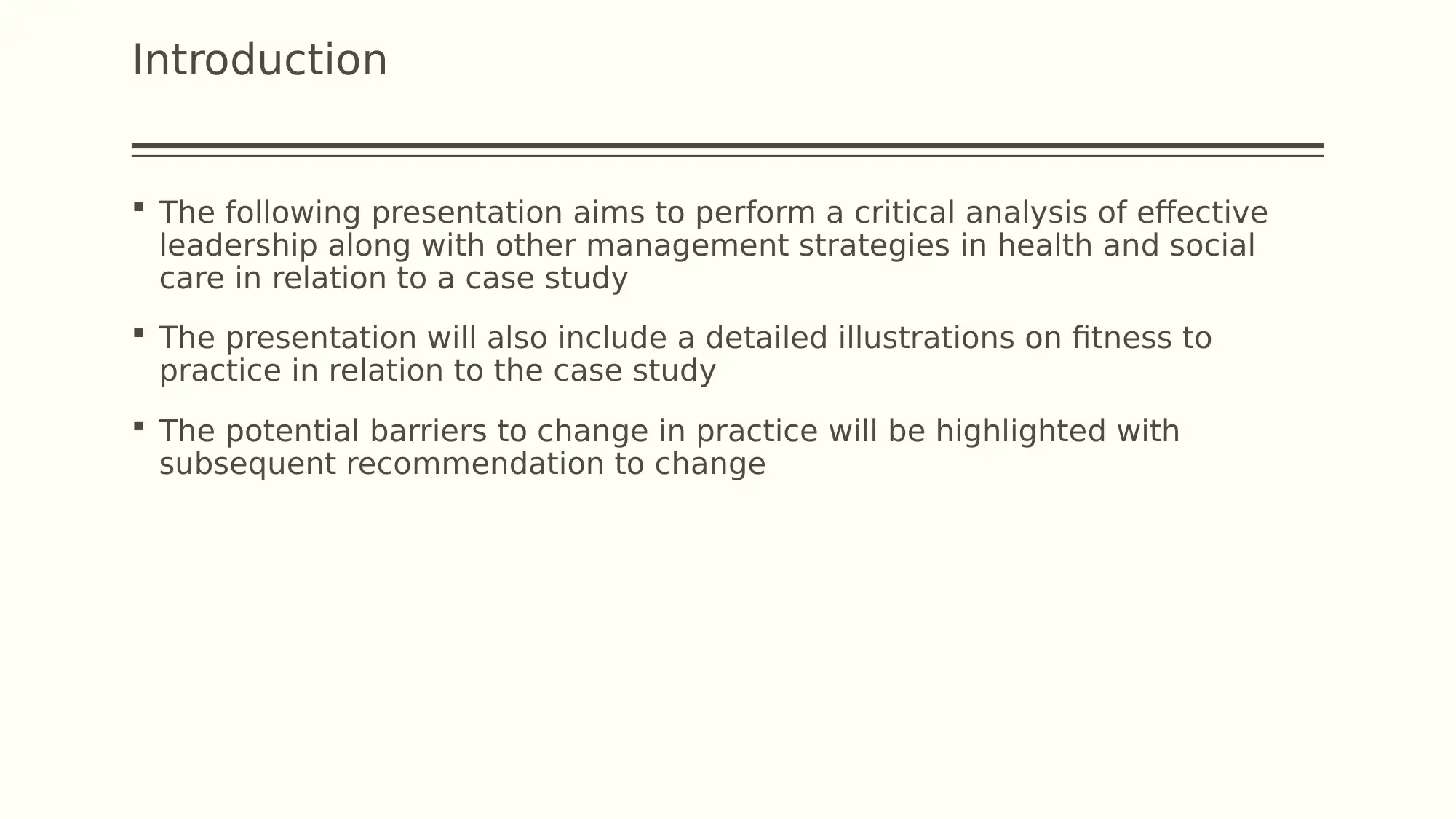
Introduction
The following presentation aims to perform a critical analysis of effective
leadership along with other management strategies in health and social
care in relation to a case study
The presentation will also include a detailed illustrations on fitness to
practice in relation to the case study
The potential barriers to change in practice will be highlighted with
subsequent recommendation to change
The following presentation aims to perform a critical analysis of effective
leadership along with other management strategies in health and social
care in relation to a case study
The presentation will also include a detailed illustrations on fitness to
practice in relation to the case study
The potential barriers to change in practice will be highlighted with
subsequent recommendation to change
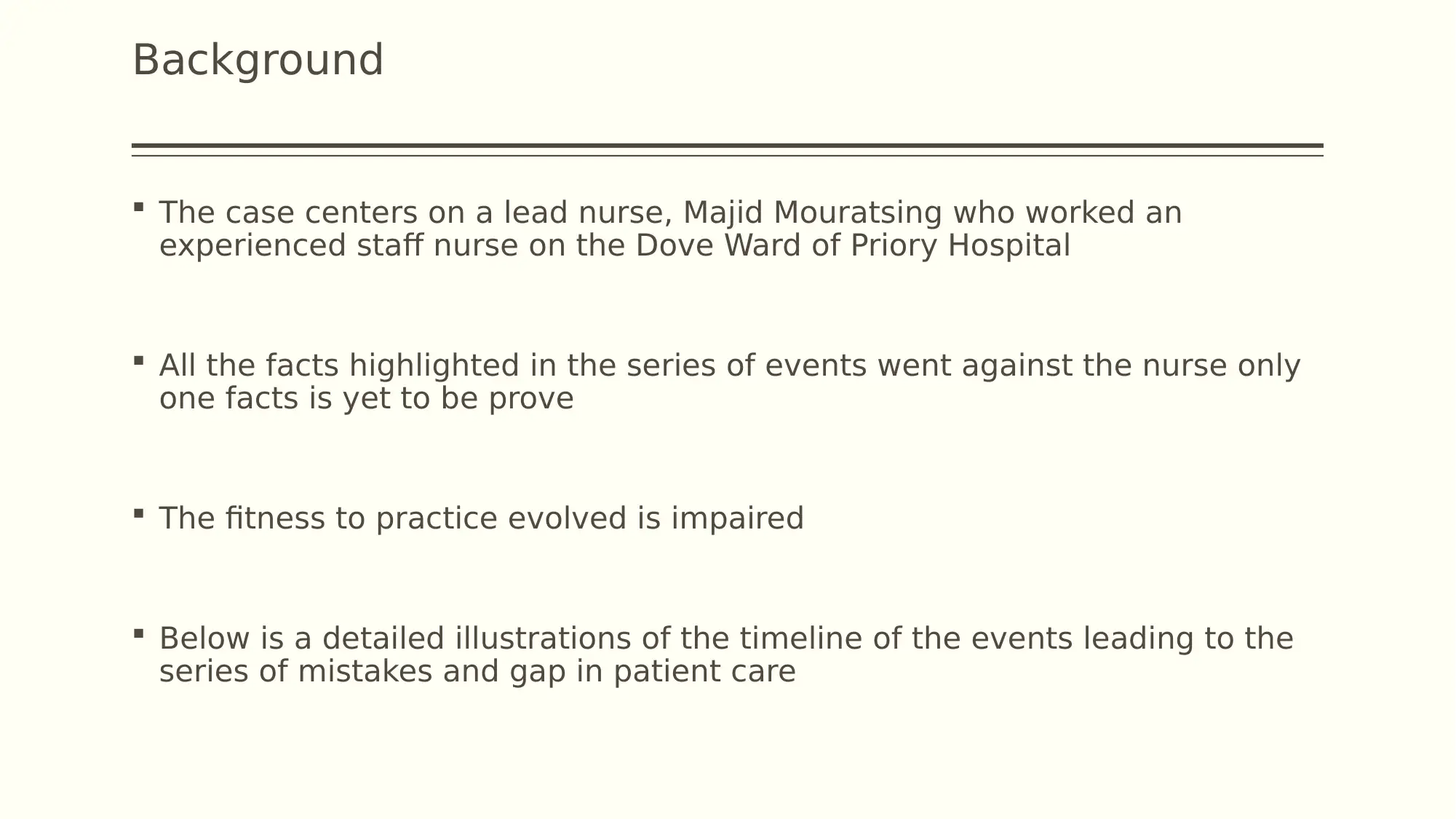
Background
The case centers on a lead nurse, Majid Mouratsing who worked an
experienced staff nurse on the Dove Ward of Priory Hospital
All the facts highlighted in the series of events went against the nurse only
one facts is yet to be prove
The fitness to practice evolved is impaired
Below is a detailed illustrations of the timeline of the events leading to the
series of mistakes and gap in patient care
The case centers on a lead nurse, Majid Mouratsing who worked an
experienced staff nurse on the Dove Ward of Priory Hospital
All the facts highlighted in the series of events went against the nurse only
one facts is yet to be prove
The fitness to practice evolved is impaired
Below is a detailed illustrations of the timeline of the events leading to the
series of mistakes and gap in patient care
⊘ This is a preview!⊘
Do you want full access?
Subscribe today to unlock all pages.

Trusted by 1+ million students worldwide
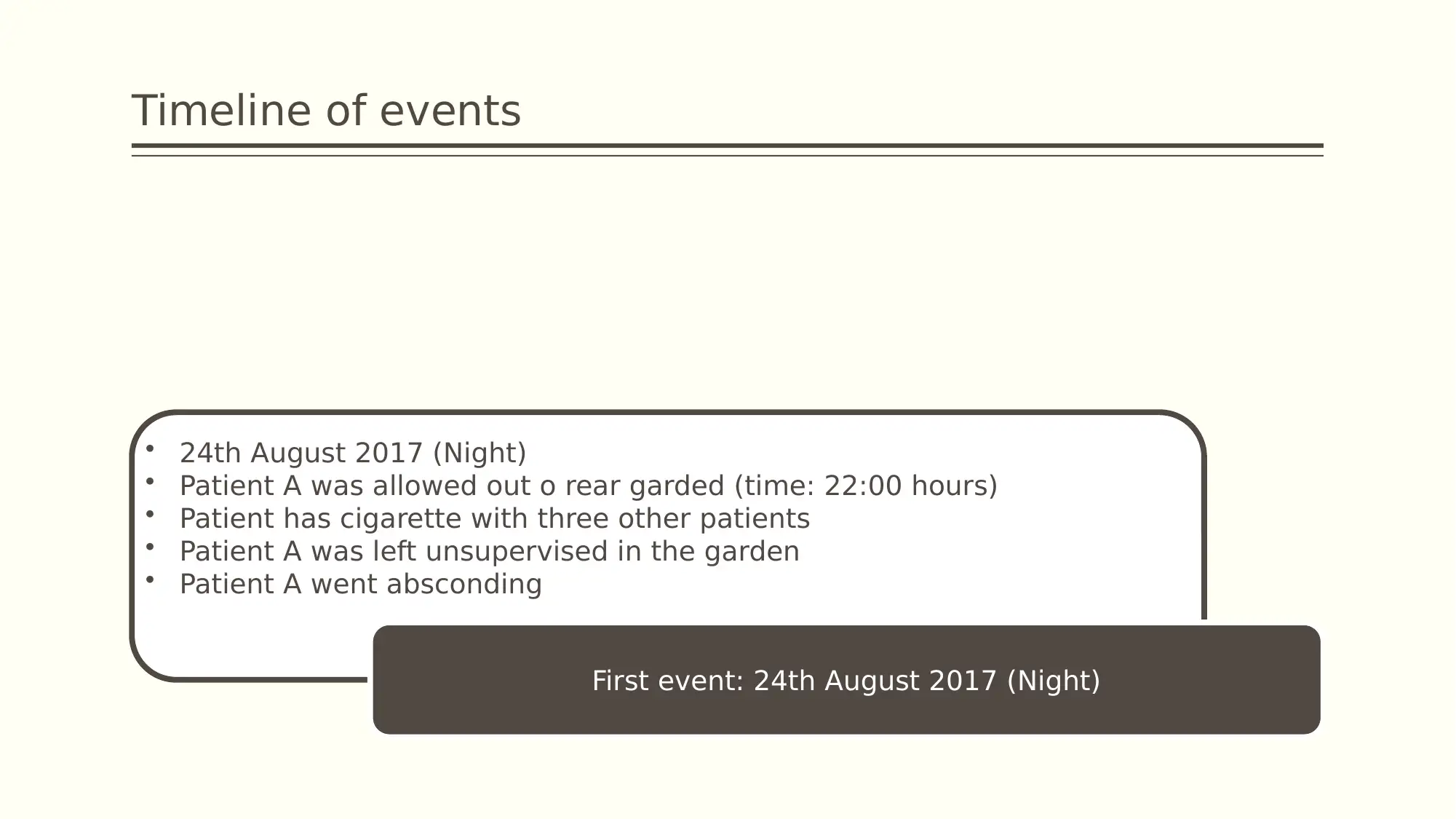
Timeline of events
• 24th August 2017 (Night)
• Patient A was allowed out o rear garded (time: 22:00 hours)
• Patient has cigarette with three other patients
• Patient A was left unsupervised in the garden
• Patient A went absconding
First event: 24th August 2017 (Night)
• 24th August 2017 (Night)
• Patient A was allowed out o rear garded (time: 22:00 hours)
• Patient has cigarette with three other patients
• Patient A was left unsupervised in the garden
• Patient A went absconding
First event: 24th August 2017 (Night)
Paraphrase This Document
Need a fresh take? Get an instant paraphrase of this document with our AI Paraphraser
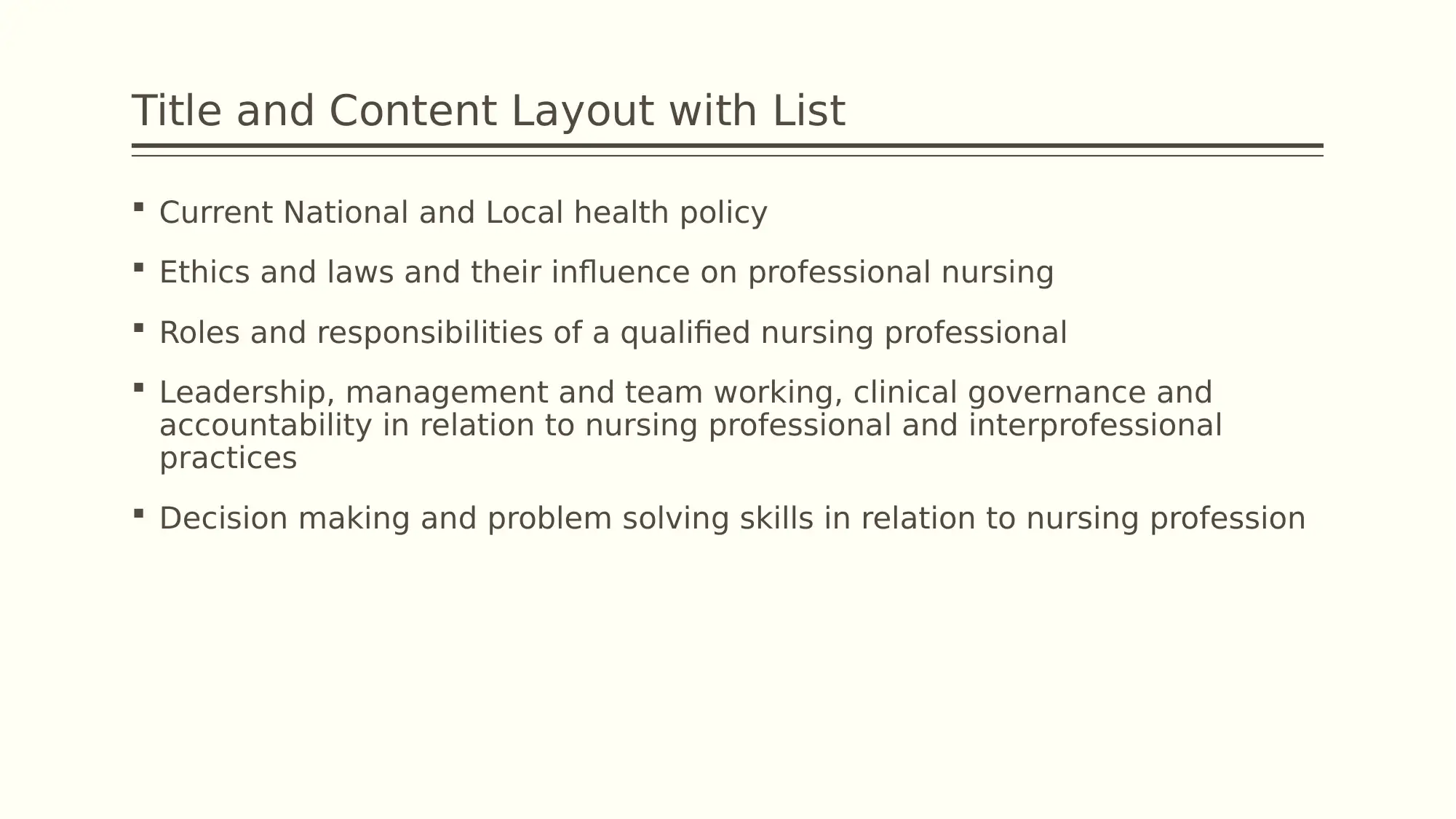
Title and Content Layout with List
Current National and Local health policy
Ethics and laws and their influence on professional nursing
Roles and responsibilities of a qualified nursing professional
Leadership, management and team working, clinical governance and
accountability in relation to nursing professional and interprofessional
practices
Decision making and problem solving skills in relation to nursing profession
Current National and Local health policy
Ethics and laws and their influence on professional nursing
Roles and responsibilities of a qualified nursing professional
Leadership, management and team working, clinical governance and
accountability in relation to nursing professional and interprofessional
practices
Decision making and problem solving skills in relation to nursing profession
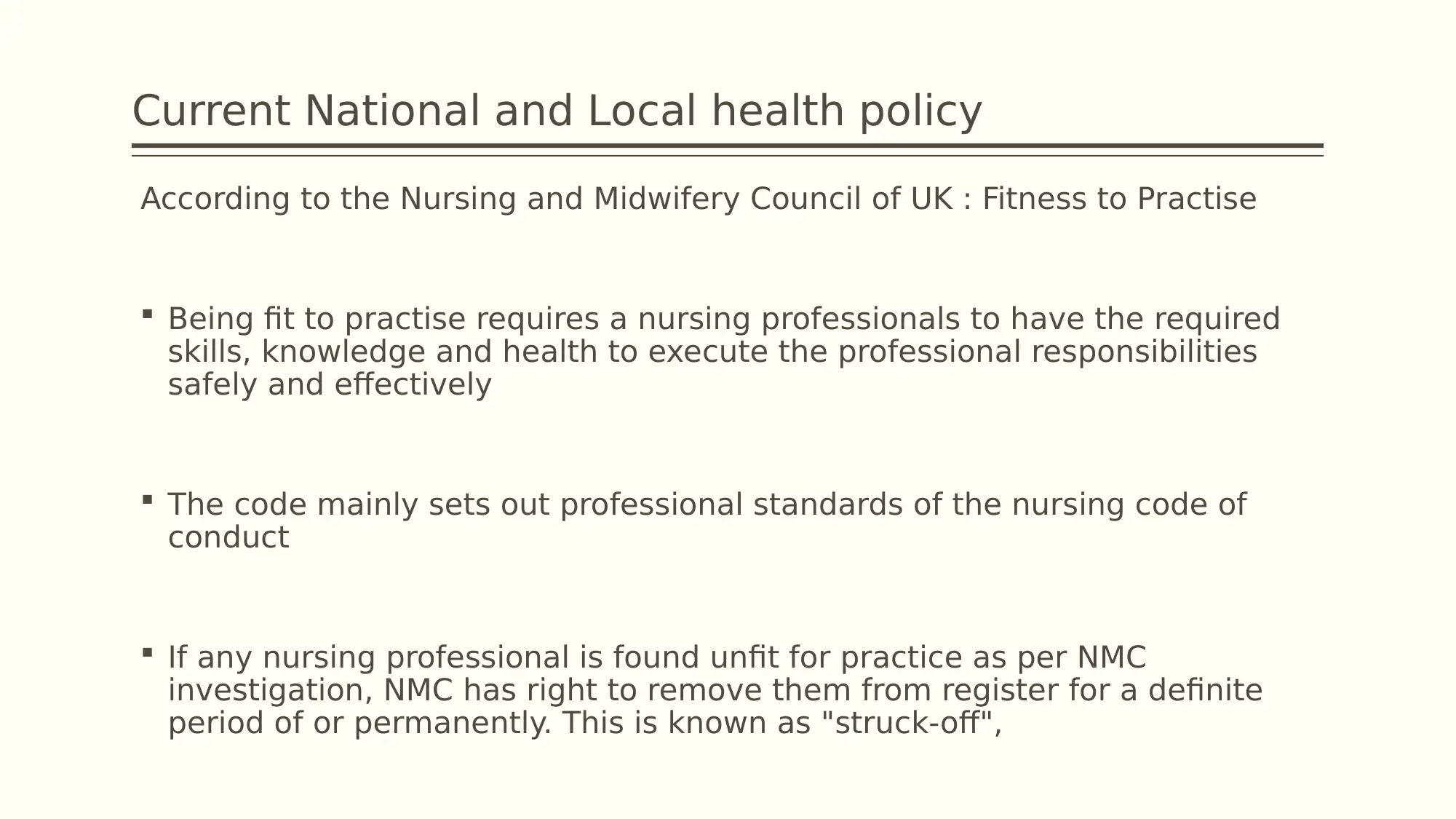
Current National and Local health policy
According to the Nursing and Midwifery Council of UK : Fitness to Practise
Being fit to practise requires a nursing professionals to have the required
skills, knowledge and health to execute the professional responsibilities
safely and effectively
The code mainly sets out professional standards of the nursing code of
conduct
If any nursing professional is found unfit for practice as per NMC
investigation, NMC has right to remove them from register for a definite
period of or permanently. This is known as "struck-off",
According to the Nursing and Midwifery Council of UK : Fitness to Practise
Being fit to practise requires a nursing professionals to have the required
skills, knowledge and health to execute the professional responsibilities
safely and effectively
The code mainly sets out professional standards of the nursing code of
conduct
If any nursing professional is found unfit for practice as per NMC
investigation, NMC has right to remove them from register for a definite
period of or permanently. This is known as "struck-off",
⊘ This is a preview!⊘
Do you want full access?
Subscribe today to unlock all pages.

Trusted by 1+ million students worldwide
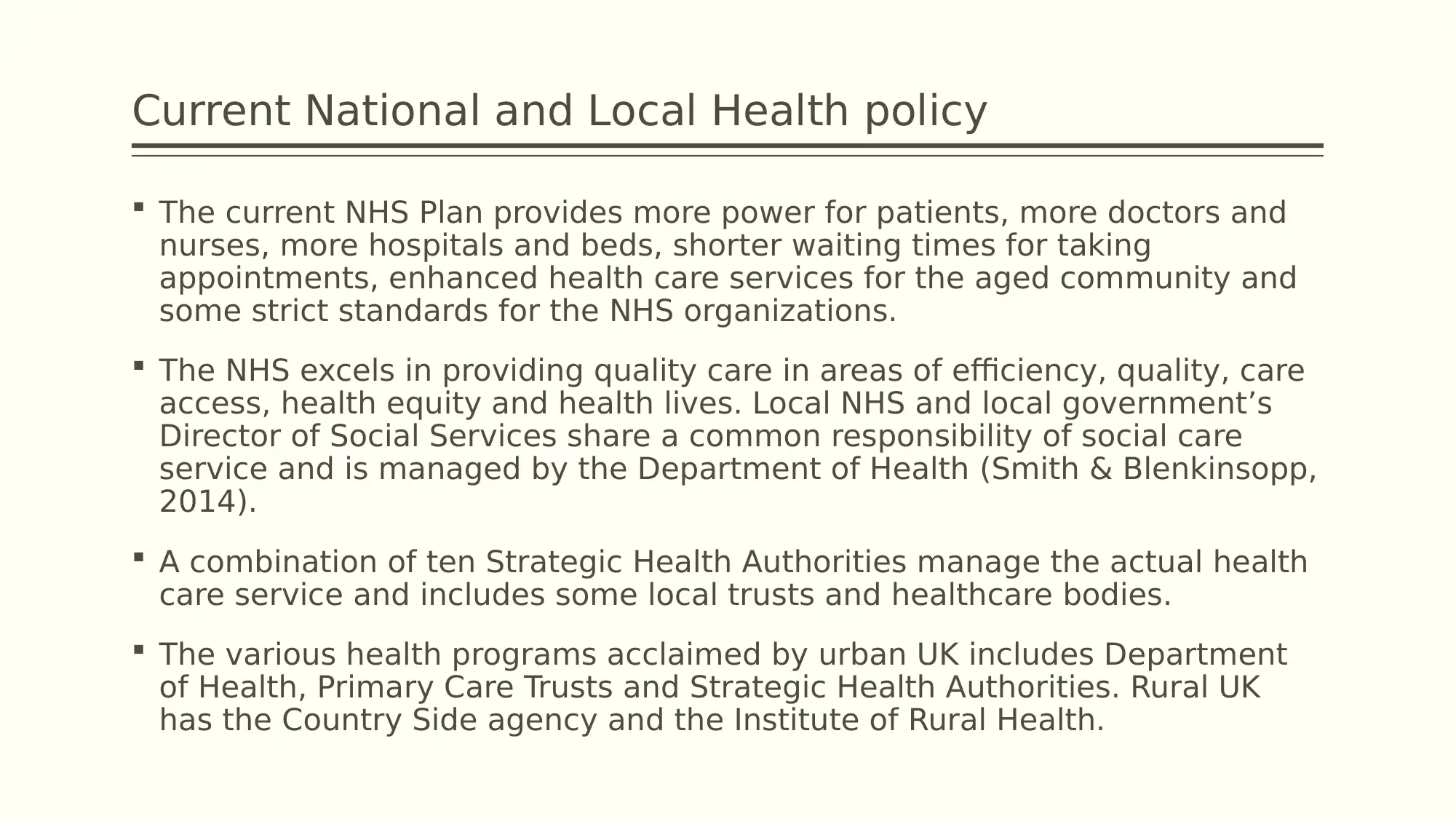
Current National and Local Health policy
The current NHS Plan provides more power for patients, more doctors and
nurses, more hospitals and beds, shorter waiting times for taking
appointments, enhanced health care services for the aged community and
some strict standards for the NHS organizations.
The NHS excels in providing quality care in areas of efficiency, quality, care
access, health equity and health lives. Local NHS and local government’s
Director of Social Services share a common responsibility of social care
service and is managed by the Department of Health (Smith & Blenkinsopp,
2014).
A combination of ten Strategic Health Authorities manage the actual health
care service and includes some local trusts and healthcare bodies.
The various health programs acclaimed by urban UK includes Department
of Health, Primary Care Trusts and Strategic Health Authorities. Rural UK
has the Country Side agency and the Institute of Rural Health.
The current NHS Plan provides more power for patients, more doctors and
nurses, more hospitals and beds, shorter waiting times for taking
appointments, enhanced health care services for the aged community and
some strict standards for the NHS organizations.
The NHS excels in providing quality care in areas of efficiency, quality, care
access, health equity and health lives. Local NHS and local government’s
Director of Social Services share a common responsibility of social care
service and is managed by the Department of Health (Smith & Blenkinsopp,
2014).
A combination of ten Strategic Health Authorities manage the actual health
care service and includes some local trusts and healthcare bodies.
The various health programs acclaimed by urban UK includes Department
of Health, Primary Care Trusts and Strategic Health Authorities. Rural UK
has the Country Side agency and the Institute of Rural Health.
Paraphrase This Document
Need a fresh take? Get an instant paraphrase of this document with our AI Paraphraser
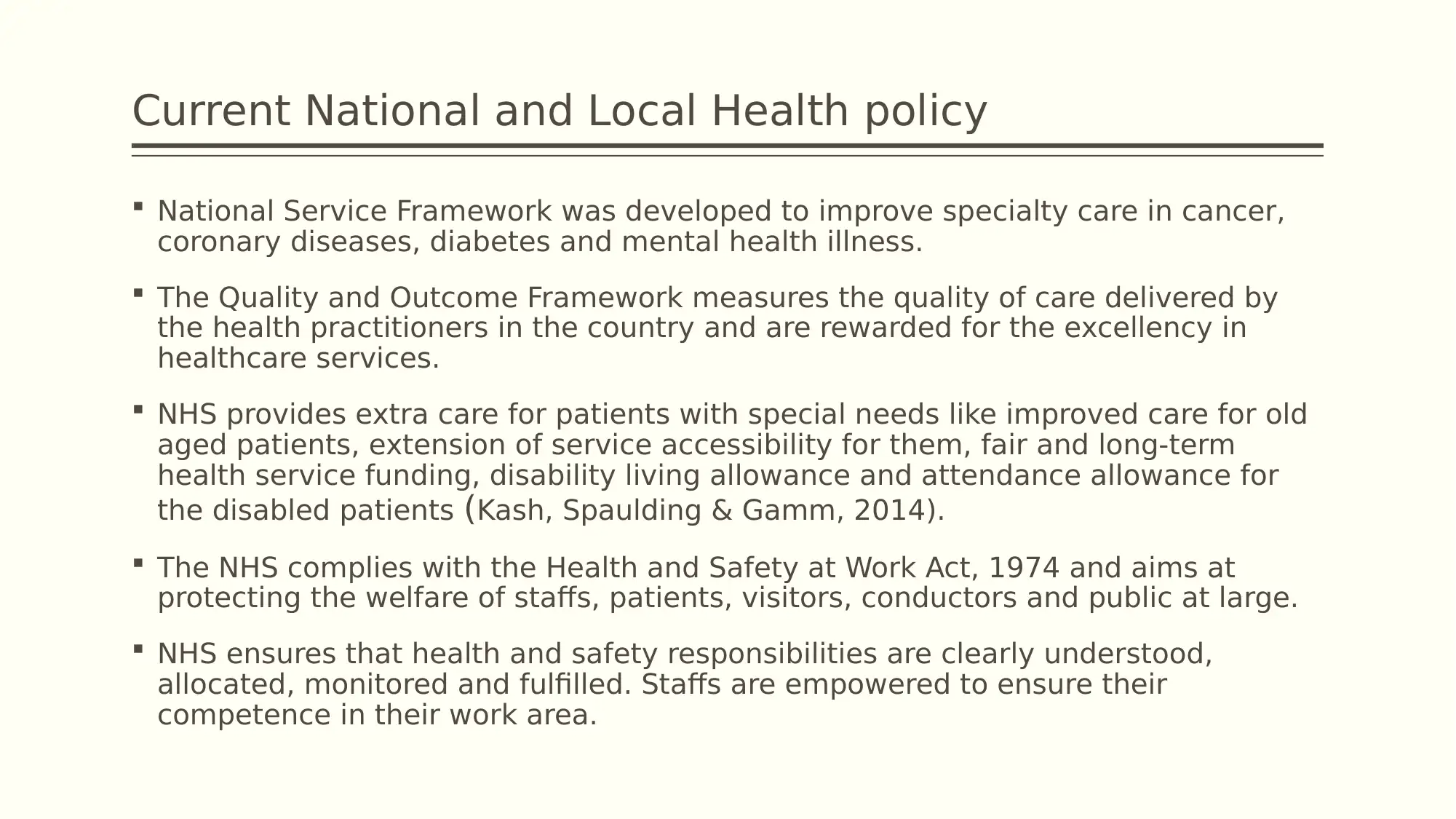
Current National and Local Health policy
National Service Framework was developed to improve specialty care in cancer,
coronary diseases, diabetes and mental health illness.
The Quality and Outcome Framework measures the quality of care delivered by
the health practitioners in the country and are rewarded for the excellency in
healthcare services.
NHS provides extra care for patients with special needs like improved care for old
aged patients, extension of service accessibility for them, fair and long-term
health service funding, disability living allowance and attendance allowance for
the disabled patients (Kash, Spaulding & Gamm, 2014).
The NHS complies with the Health and Safety at Work Act, 1974 and aims at
protecting the welfare of staffs, patients, visitors, conductors and public at large.
NHS ensures that health and safety responsibilities are clearly understood,
allocated, monitored and fulfilled. Staffs are empowered to ensure their
competence in their work area.
National Service Framework was developed to improve specialty care in cancer,
coronary diseases, diabetes and mental health illness.
The Quality and Outcome Framework measures the quality of care delivered by
the health practitioners in the country and are rewarded for the excellency in
healthcare services.
NHS provides extra care for patients with special needs like improved care for old
aged patients, extension of service accessibility for them, fair and long-term
health service funding, disability living allowance and attendance allowance for
the disabled patients (Kash, Spaulding & Gamm, 2014).
The NHS complies with the Health and Safety at Work Act, 1974 and aims at
protecting the welfare of staffs, patients, visitors, conductors and public at large.
NHS ensures that health and safety responsibilities are clearly understood,
allocated, monitored and fulfilled. Staffs are empowered to ensure their
competence in their work area.
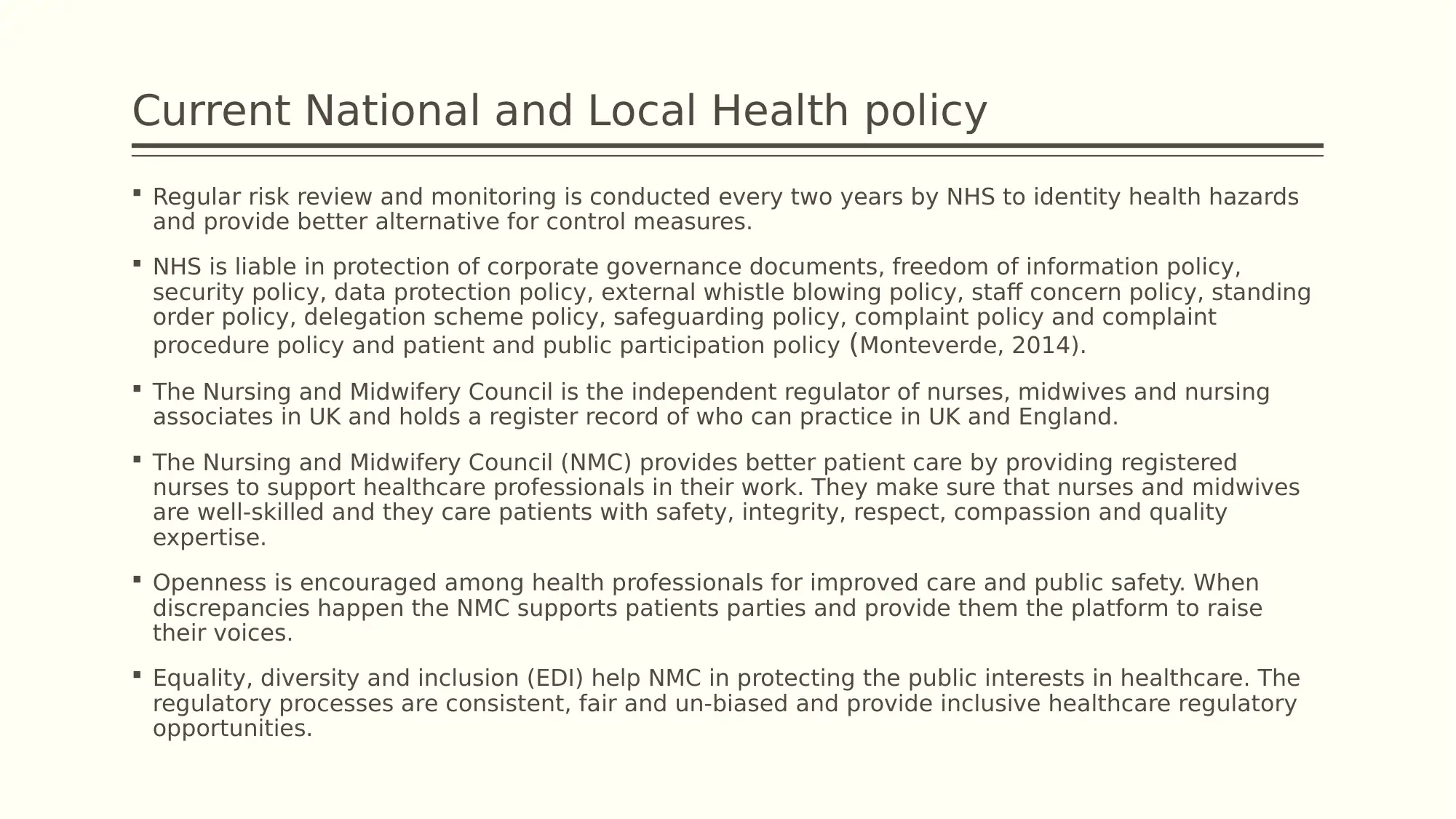
Current National and Local Health policy
Regular risk review and monitoring is conducted every two years by NHS to identity health hazards
and provide better alternative for control measures.
NHS is liable in protection of corporate governance documents, freedom of information policy,
security policy, data protection policy, external whistle blowing policy, staff concern policy, standing
order policy, delegation scheme policy, safeguarding policy, complaint policy and complaint
procedure policy and patient and public participation policy (Monteverde, 2014).
The Nursing and Midwifery Council is the independent regulator of nurses, midwives and nursing
associates in UK and holds a register record of who can practice in UK and England.
The Nursing and Midwifery Council (NMC) provides better patient care by providing registered
nurses to support healthcare professionals in their work. They make sure that nurses and midwives
are well-skilled and they care patients with safety, integrity, respect, compassion and quality
expertise.
Openness is encouraged among health professionals for improved care and public safety. When
discrepancies happen the NMC supports patients parties and provide them the platform to raise
their voices.
Equality, diversity and inclusion (EDI) help NMC in protecting the public interests in healthcare. The
regulatory processes are consistent, fair and un-biased and provide inclusive healthcare regulatory
opportunities.
Regular risk review and monitoring is conducted every two years by NHS to identity health hazards
and provide better alternative for control measures.
NHS is liable in protection of corporate governance documents, freedom of information policy,
security policy, data protection policy, external whistle blowing policy, staff concern policy, standing
order policy, delegation scheme policy, safeguarding policy, complaint policy and complaint
procedure policy and patient and public participation policy (Monteverde, 2014).
The Nursing and Midwifery Council is the independent regulator of nurses, midwives and nursing
associates in UK and holds a register record of who can practice in UK and England.
The Nursing and Midwifery Council (NMC) provides better patient care by providing registered
nurses to support healthcare professionals in their work. They make sure that nurses and midwives
are well-skilled and they care patients with safety, integrity, respect, compassion and quality
expertise.
Openness is encouraged among health professionals for improved care and public safety. When
discrepancies happen the NMC supports patients parties and provide them the platform to raise
their voices.
Equality, diversity and inclusion (EDI) help NMC in protecting the public interests in healthcare. The
regulatory processes are consistent, fair and un-biased and provide inclusive healthcare regulatory
opportunities.
⊘ This is a preview!⊘
Do you want full access?
Subscribe today to unlock all pages.

Trusted by 1+ million students worldwide
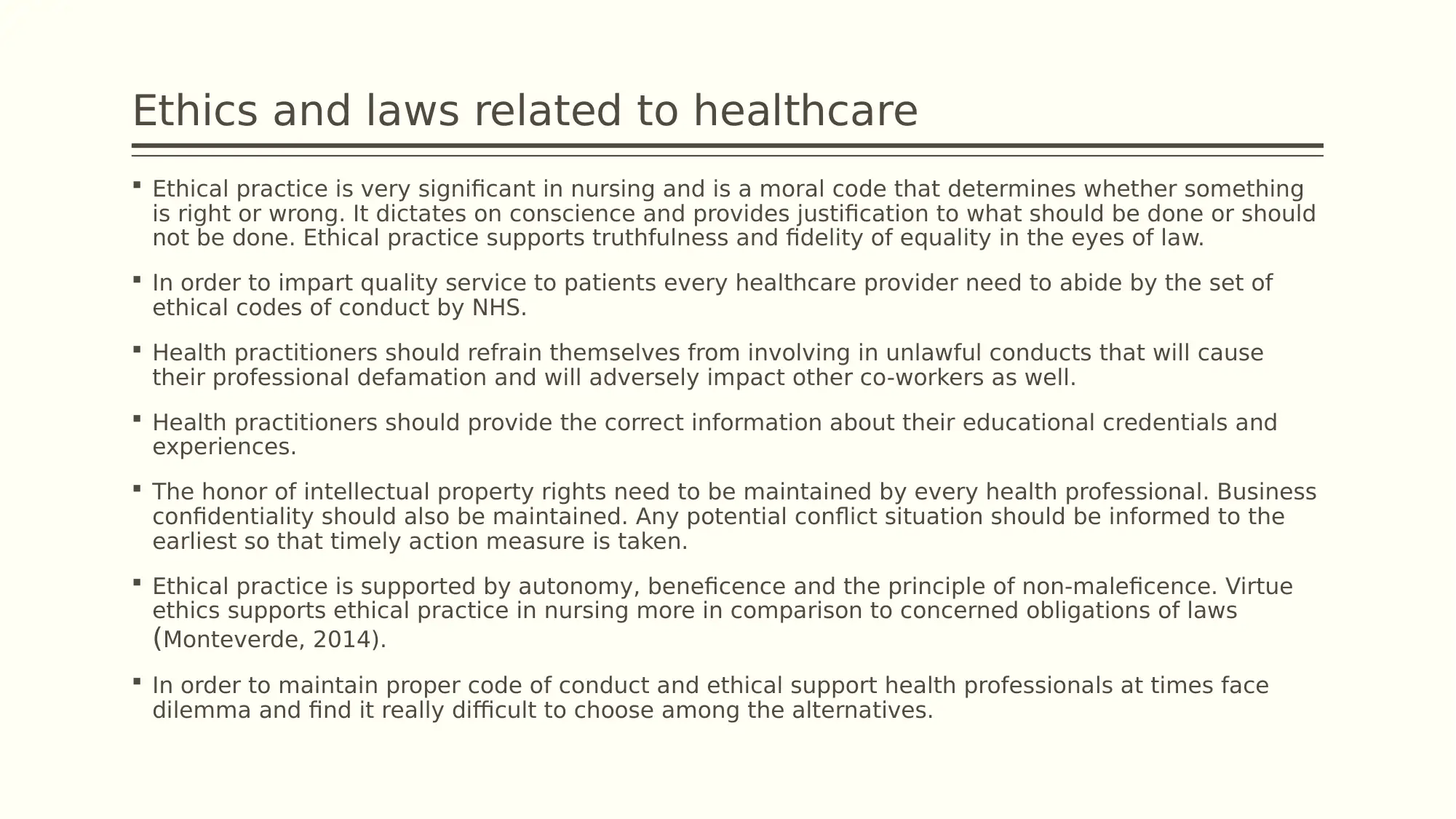
Ethics and laws related to healthcare
Ethical practice is very significant in nursing and is a moral code that determines whether something
is right or wrong. It dictates on conscience and provides justification to what should be done or should
not be done. Ethical practice supports truthfulness and fidelity of equality in the eyes of law.
In order to impart quality service to patients every healthcare provider need to abide by the set of
ethical codes of conduct by NHS.
Health practitioners should refrain themselves from involving in unlawful conducts that will cause
their professional defamation and will adversely impact other co-workers as well.
Health practitioners should provide the correct information about their educational credentials and
experiences.
The honor of intellectual property rights need to be maintained by every health professional. Business
confidentiality should also be maintained. Any potential conflict situation should be informed to the
earliest so that timely action measure is taken.
Ethical practice is supported by autonomy, beneficence and the principle of non-maleficence. Virtue
ethics supports ethical practice in nursing more in comparison to concerned obligations of laws
(Monteverde, 2014).
In order to maintain proper code of conduct and ethical support health professionals at times face
dilemma and find it really difficult to choose among the alternatives.
Ethical practice is very significant in nursing and is a moral code that determines whether something
is right or wrong. It dictates on conscience and provides justification to what should be done or should
not be done. Ethical practice supports truthfulness and fidelity of equality in the eyes of law.
In order to impart quality service to patients every healthcare provider need to abide by the set of
ethical codes of conduct by NHS.
Health practitioners should refrain themselves from involving in unlawful conducts that will cause
their professional defamation and will adversely impact other co-workers as well.
Health practitioners should provide the correct information about their educational credentials and
experiences.
The honor of intellectual property rights need to be maintained by every health professional. Business
confidentiality should also be maintained. Any potential conflict situation should be informed to the
earliest so that timely action measure is taken.
Ethical practice is supported by autonomy, beneficence and the principle of non-maleficence. Virtue
ethics supports ethical practice in nursing more in comparison to concerned obligations of laws
(Monteverde, 2014).
In order to maintain proper code of conduct and ethical support health professionals at times face
dilemma and find it really difficult to choose among the alternatives.
Paraphrase This Document
Need a fresh take? Get an instant paraphrase of this document with our AI Paraphraser
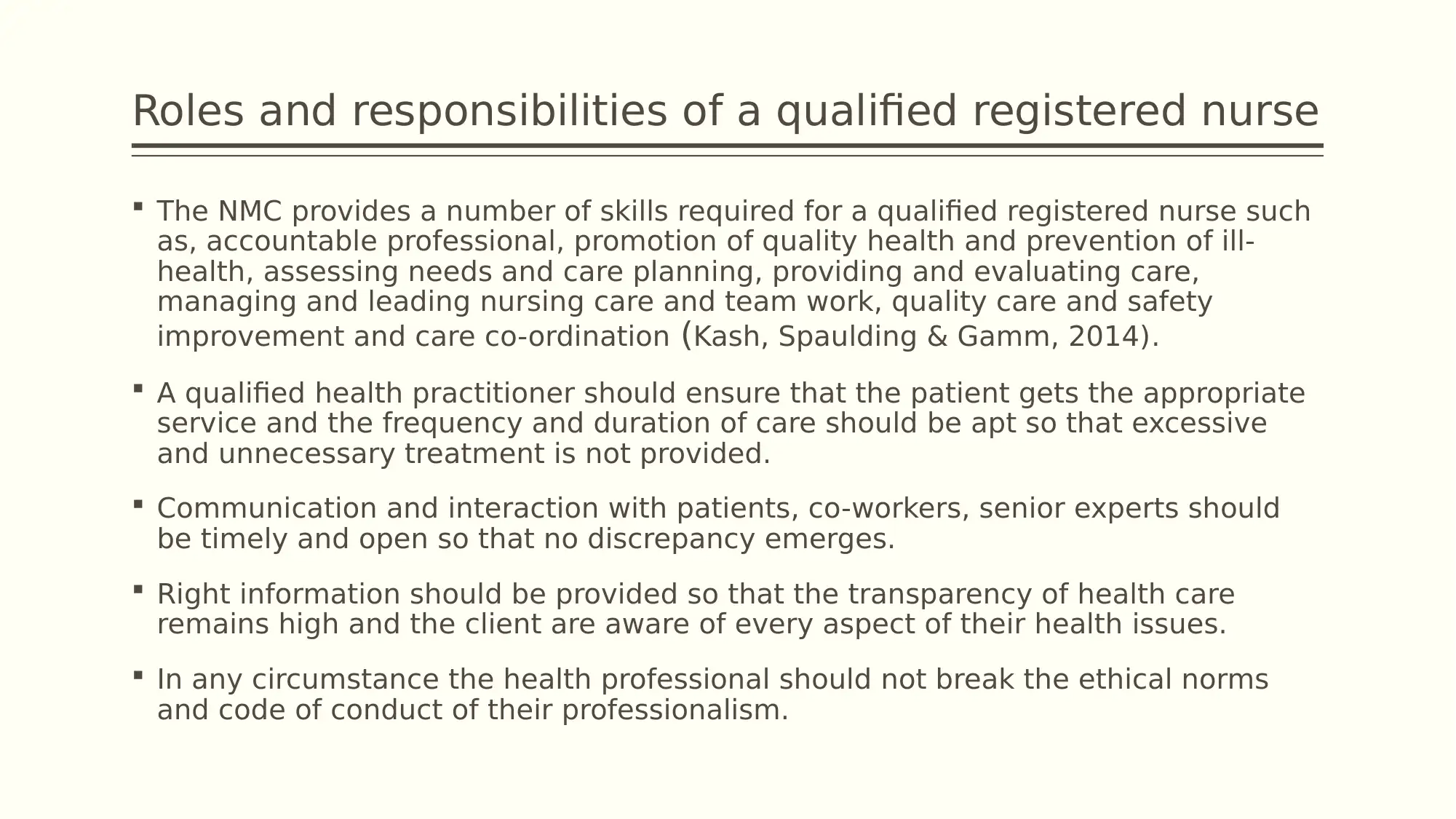
Roles and responsibilities of a qualified registered nurse
The NMC provides a number of skills required for a qualified registered nurse such
as, accountable professional, promotion of quality health and prevention of ill-
health, assessing needs and care planning, providing and evaluating care,
managing and leading nursing care and team work, quality care and safety
improvement and care co-ordination (Kash, Spaulding & Gamm, 2014).
A qualified health practitioner should ensure that the patient gets the appropriate
service and the frequency and duration of care should be apt so that excessive
and unnecessary treatment is not provided.
Communication and interaction with patients, co-workers, senior experts should
be timely and open so that no discrepancy emerges.
Right information should be provided so that the transparency of health care
remains high and the client are aware of every aspect of their health issues.
In any circumstance the health professional should not break the ethical norms
and code of conduct of their professionalism.
The NMC provides a number of skills required for a qualified registered nurse such
as, accountable professional, promotion of quality health and prevention of ill-
health, assessing needs and care planning, providing and evaluating care,
managing and leading nursing care and team work, quality care and safety
improvement and care co-ordination (Kash, Spaulding & Gamm, 2014).
A qualified health practitioner should ensure that the patient gets the appropriate
service and the frequency and duration of care should be apt so that excessive
and unnecessary treatment is not provided.
Communication and interaction with patients, co-workers, senior experts should
be timely and open so that no discrepancy emerges.
Right information should be provided so that the transparency of health care
remains high and the client are aware of every aspect of their health issues.
In any circumstance the health professional should not break the ethical norms
and code of conduct of their professionalism.
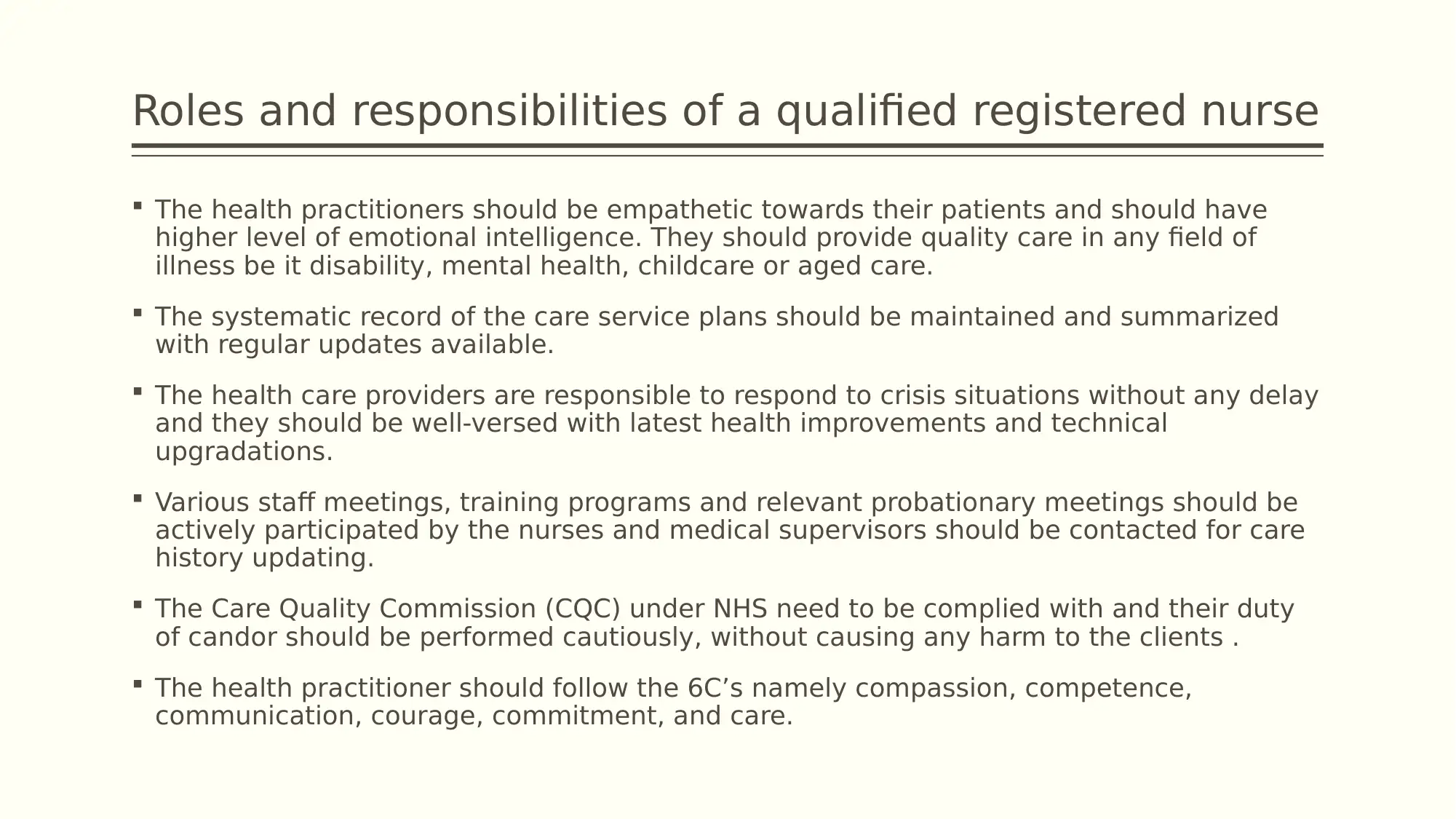
Roles and responsibilities of a qualified registered nurse
The health practitioners should be empathetic towards their patients and should have
higher level of emotional intelligence. They should provide quality care in any field of
illness be it disability, mental health, childcare or aged care.
The systematic record of the care service plans should be maintained and summarized
with regular updates available.
The health care providers are responsible to respond to crisis situations without any delay
and they should be well-versed with latest health improvements and technical
upgradations.
Various staff meetings, training programs and relevant probationary meetings should be
actively participated by the nurses and medical supervisors should be contacted for care
history updating.
The Care Quality Commission (CQC) under NHS need to be complied with and their duty
of candor should be performed cautiously, without causing any harm to the clients .
The health practitioner should follow the 6C’s namely compassion, competence,
communication, courage, commitment, and care.
The health practitioners should be empathetic towards their patients and should have
higher level of emotional intelligence. They should provide quality care in any field of
illness be it disability, mental health, childcare or aged care.
The systematic record of the care service plans should be maintained and summarized
with regular updates available.
The health care providers are responsible to respond to crisis situations without any delay
and they should be well-versed with latest health improvements and technical
upgradations.
Various staff meetings, training programs and relevant probationary meetings should be
actively participated by the nurses and medical supervisors should be contacted for care
history updating.
The Care Quality Commission (CQC) under NHS need to be complied with and their duty
of candor should be performed cautiously, without causing any harm to the clients .
The health practitioner should follow the 6C’s namely compassion, competence,
communication, courage, commitment, and care.
⊘ This is a preview!⊘
Do you want full access?
Subscribe today to unlock all pages.

Trusted by 1+ million students worldwide
1 out of 26
Related Documents
Your All-in-One AI-Powered Toolkit for Academic Success.
+13062052269
info@desklib.com
Available 24*7 on WhatsApp / Email
![[object Object]](/_next/static/media/star-bottom.7253800d.svg)
Unlock your academic potential
Copyright © 2020–2026 A2Z Services. All Rights Reserved. Developed and managed by ZUCOL.





